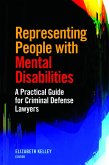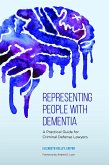Trauma-Informed Law discusses the many intersections of trauma and law where it is often denied, ignored, covered up, or avoided. The book is intended for lawyers, law students, legal educators, and judges, as well as decision-makers, administrators, staff, and anyone impacted by the court.
It is a collection of cases and situations with practice implications for other cases impacted by trauma, whether those cases and situations involve race, class, gender, different physical or mental abilities (or disability), sexual orientation or other diverse factors including the impact of developmental health issues, addiction, substance abuse, poverty, access to opportunities, community safety or belonging and more. Each scenario holds useful implications for both practice issues within the same area of law and even in other areas of law or the legal system.
Table of Contents:
It is a collection of cases and situations with practice implications for other cases impacted by trauma, whether those cases and situations involve race, class, gender, different physical or mental abilities (or disability), sexual orientation or other diverse factors including the impact of developmental health issues, addiction, substance abuse, poverty, access to opportunities, community safety or belonging and more. Each scenario holds useful implications for both practice issues within the same area of law and even in other areas of law or the legal system.
Table of Contents:
- Introduction to Trauma-Informed Lawyering
- Why it Matters: The Context for Trauma-Informed Lawyering
- Lawyers' Perspectives on Trauma: What is Trauma in the Law & Lawyering
- Legal Practice and Trauma
- Tools for Lawyers and Practice Areas: Underlying Principles of Trauma-Informed Tools
- Trauma & Healing in Legal Systems: Courts and Judges
- Legal Education and Trauma
- Systems Change and Trauma: The Legal System and Systematic or Collective Trauma
- Conclusion
Dieser Download kann aus rechtlichen Gründen nur mit Rechnungsadresse in A, D ausgeliefert werden.









